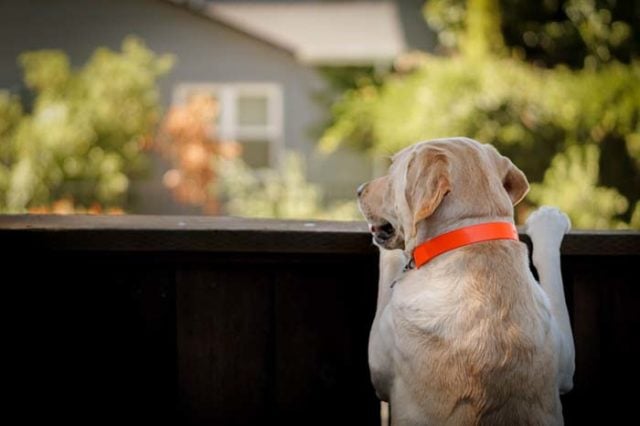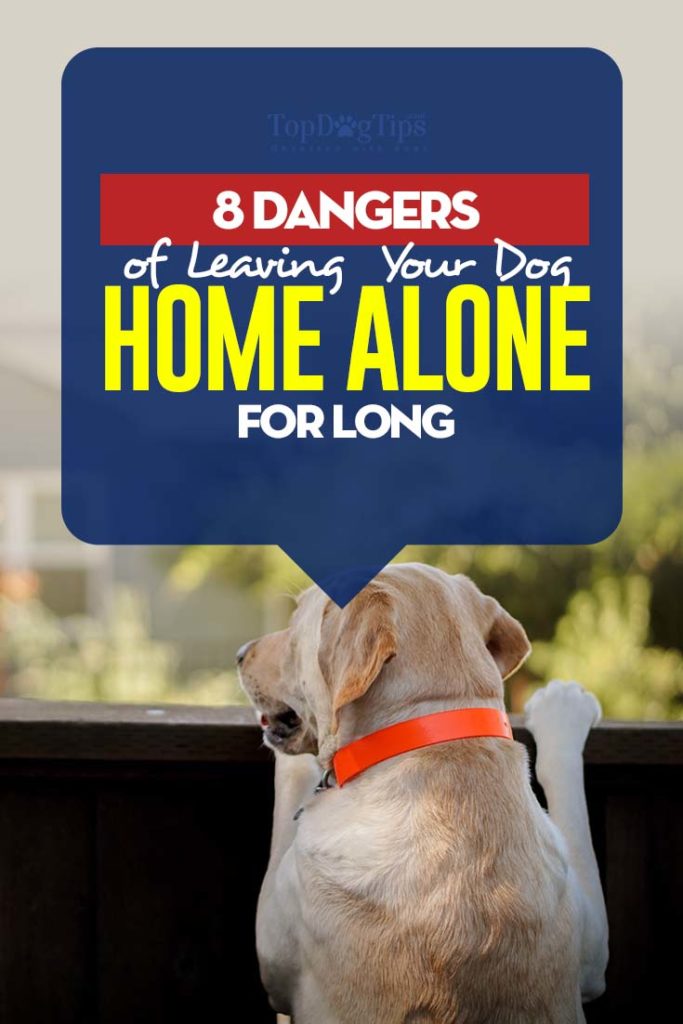
Table of Contents
Dogs are social animals, but some owners forget to stop and think about how important it is for our four-legged friends to be around us.
For a dog pack or a wolf pack, it’s completely normal for the entire pack to stay together at all times.
Every once in a while, a member or the alpha of the pack can leave briefly for one reason or another but generally speaking, dogs are always used to be together and/or to know where the others are.
With that in mind, from a dog’s point of view, it’s quite unnatural for the owner to constantly be AWOL.
Of course, dogs are highly adaptable animals, so they can get used to a schedule that has you missing for several hours each day.
Plus, different breeds have different socialization needs – some can spend more time alone, while others get restless after just a couple of hours.
But nevertheless, there are dangers of leaving your dog home alone for too long.
ALSO READ: How to Find a Missing Dog – 8 Things You Must Do Right Away
Why You Shouldn't Leave Fido Alone at Home for Long
1. Separation anxiety, loneliness, and depression.
If you’ve gotten yourself an indoor dog, chances are that you view him as a part of the family.
If that’s the case, then you probably care if your dog is going through separation anxiety or a crippling loneliness.
Dogs feel these things as much as we do and maybe even more severely due to the more “primal” way they think.
A depressed dog can fall so deep into that bad mood that he stops eating, he stops playing and interacting with you when you’re home, and he even falls ill of the various health problems that depression can lead to.
2. Lack of mental stimulation.
 Dogs are intelligent animals; some breed even more than others. They can be taught a myriad of tricks and commands, which is one of the sources of mental stimulation. Depriving an intelligent and social animal from consistent brain stimulation and human contact for large periods of time can drastically reduce the amount of things you can do with your dog and the fun the two of you can have together.
Dogs are intelligent animals; some breed even more than others. They can be taught a myriad of tricks and commands, which is one of the sources of mental stimulation. Depriving an intelligent and social animal from consistent brain stimulation and human contact for large periods of time can drastically reduce the amount of things you can do with your dog and the fun the two of you can have together.
You can compensate for that by giving your dog plenty of mental stimulation when you’re home or even better – by leaving food puzzles, interactive toys or organizing toy hunts around the house for your dog before you go to work.
Socialization is very important for dogs. Not just so they can feel good around people and other animals, but so that they can grow, learn and acquire certain basic social skills that we usually want them to have to thrive in “human environment.”
If you want your dog to behave well around strangers and guests, if you want him to play well with other dogs and kids outside, you need to spend enough time with your pooch to socialize him properly.
Especially if you plan on having more pets or children soon, you need to make sure that your pet has got plenty of social interactions with you, and with other people as well.
Leaving your dog alone for too long each day will make your dog weary of anyone’s company, and he's likely to become anti-social.
A good way to avoid this while you’re away for work is to get your dog a pet sitter or a dog walker for when you’re out for too long.
4. Excessive barking.
 Barking is another consequence of loneliness, lack of consistent mental stimulation, and a lack of proper social interactions. It’s especially unpleasant when you live in an apartment, as barking can seriously disturb your neighbors, and you can’t control it while you’re away. That’s one of the main reason why breeds that are prone to barking are not recommended for apartment life, and one of the reasons owners abandon their dogs.
Barking is another consequence of loneliness, lack of consistent mental stimulation, and a lack of proper social interactions. It’s especially unpleasant when you live in an apartment, as barking can seriously disturb your neighbors, and you can’t control it while you’re away. That’s one of the main reason why breeds that are prone to barking are not recommended for apartment life, and one of the reasons owners abandon their dogs.
To make sure that your dog doesn’t develop this annoying habit, you should train your dog against it, as well as avoid leaving your dog indoors alone for too long.
There are plenty of techniques, tools, and methods to reduce barking in dogs.
Most of these humane devices are designed to give the dog feedback and stop him from barking.
5. Destructive behavior.
This is a very common problem that a lot of dog owners face, but it's particularly bad among dogs who spend too much time indoors by themselves.
The more intelligent a dog is, the more prone he is to developing destructive behavior when left home alone without social interaction.
It’s the result of a lack of mental stimulation and the need to play and be physically active.
To avoid destructive behavior, make sure that your dog doesn’t get bored while you’re away.
You can exhaust your dog with playtime while you’re home, you can leave your dog tasks, puzzle games and prepare toy hunts while you’re away, or you can hire a pet sitter or a dog walker.
You can also use a pet camera to interact with your pup while away.
6. Disobedience.
By losing contact with you, your dog might stop seeing you as someone he needs to please, thus becoming less obedient and more resistant to your commands.
Some breeds are worse at this than others, and more competitive breeds need your presence to remind them that they follow you and not the other way around.
A dog that’s spending too much time alone each day may begin ignoring all the previous training, stop coming to your voice, and generally stop following your lead.
To make sure that doesn’t happen, you need to either spend more time at home or be extra thorough when you’re training your dog's obedience.
7. Escape attempts.
More outdoorsy dog breeds are known for their escape artistry when left alone for too long, and some dogs are particularly good at being escape artists. This isn’t because they don’t want to be home in general; they simply need to move, run and play. Sometimes, they escape because of distractions or lack of mental stimulation.
To protect your dog from escaping while you’re away you should obviously secure your home, but also – give your dog enough attention, exercise and playtime while you’re home.
A tired dog is a good dog.
8. Health issues and physical accidents.
There are certain health concerns to consider for when your dog is home alone for too long.
For one, you may miss some symptoms that you’d otherwise notice if you were around your pup more often.
There is also the risk of your dog opening the wrong door or cabinet and eating or drinking something poisonous or otherwise getting himself into trouble when he becomes bored and starts seeking adventure.
To make sure this doesn’t happen you should not only secure all health hazards in your home, but also keep your dog from getting bored.
READ NEXT: 30 Ways to Entertain a Bored Dog
Pin and share with other dog owners:













